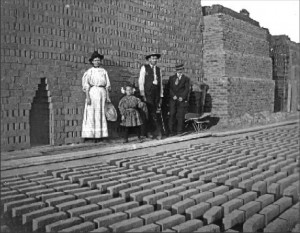By Carol Darnell Guerrero-Murphy
Published in 2007 by Ghost Road Press
ISBN 0-9796255-1-3
Reviewed by Elliot Jackson
Why, oh why, wonders the Inconstant Reader, do I routinely pass by poetry in my restless forays through my library’s shelves? Is it because I had a rigorous education in my youth, and read so much of it that I just OD’d? Or do I just forget about it? Maybe it’s simple intimidation: a good poem is such a richly-stuffed little nugget that getting through a whole book of poetry feels like downing a plate of baklava all by myself (maybe that’s why, when I do get around to reading poetry, that I love to read it aloud, or hear it read: just like that plate of baklava, a poem seems created to be shared – munched by multiple ears).
Not that surprising, when we consider the poem’s origins: in our culture poesy all begins, or so I was told in my tender green years, with Homer. He may have existed his own self, but surely we had to invent at least some of him – blind seer sage spellbinding singer, who called on muses and became one himself. It seems only fitting, therefore, that there is an ode to Homer at the heart of Table Walking at Nighthawk, a collection of poems by Adams State professor Carol Darnell Guerrero-Murphy. “Coming to Homer Late”, like most of the poems in the book’s first section, makes certain demands, or at least presumptions, upon the reader’s own education: not that you’ll get nothing out of it if you don’t recognize allusions to The Odyssey (or “On First Looking into Chapman’s Homer,” for that matter), but dig this, baby: these poems are written by a reader, a thinker, an unfolder and explicator of connections between art and literature and the fragment of the One that is an individual life. You can come hungry to this feast of riffage on the foundations of western civilization, but come prepared for challenging company.
“The Summer I Read Oedipus Rex”, for example, takes as given the shatter-eyed ghost of the too-lately-enlightened tyrant as a presence at the dinner table, but raises a toast to it only toward the end: “and we never thought that we were talking over our own deaths as we came to the last week of our bright black summer dwindling fast to fall and then winter (none of us knowing what comes after)…”
One of the poems I found the most poignant and haunting in this first section (named after the poem above), however, takes its inspiration from a different source. Titled “Patton’s French-English Manual 1917, Conversation II, Part 2, For Civilian Relief Workers,” its simple questions pile on one another like stones, each individually easy enough to bear, but collectively crushing:
What is your name?
How is it written?
How old are you?
Is your father dead?
Is your mother dead?
Have you lost a child since leaving your home?
Think The Iliad rewritten as an interview with the Trojan women: Homer rolled by Bertolt Brecht.
Later in the collection comes another of my favorites: “Instructions, Female Infant.” I won’t quote it: go and find it. Get that plate of baklava and read that poem, and a bunch of others, with your girlfriends, at the dinner table, with brandy and candles, now while summer is dwindling into fall.


